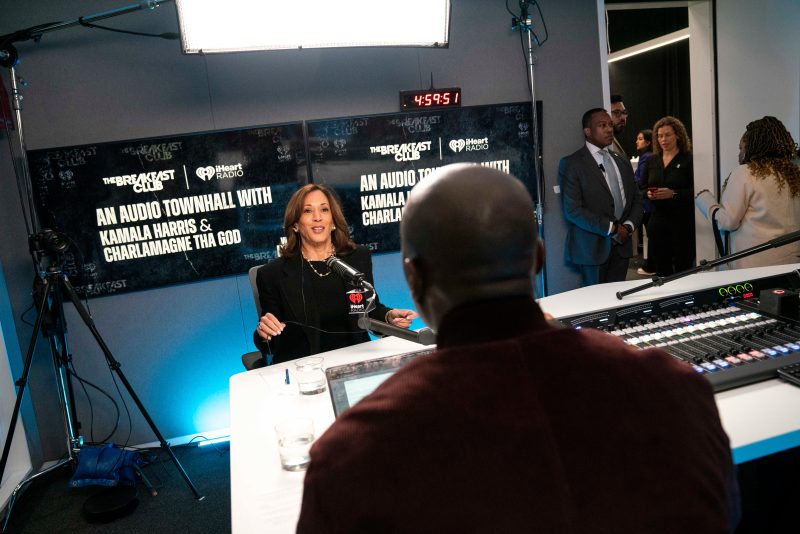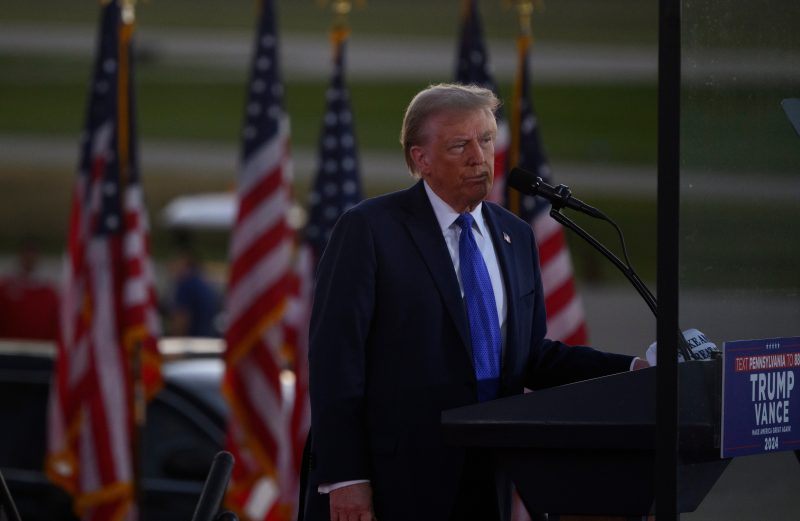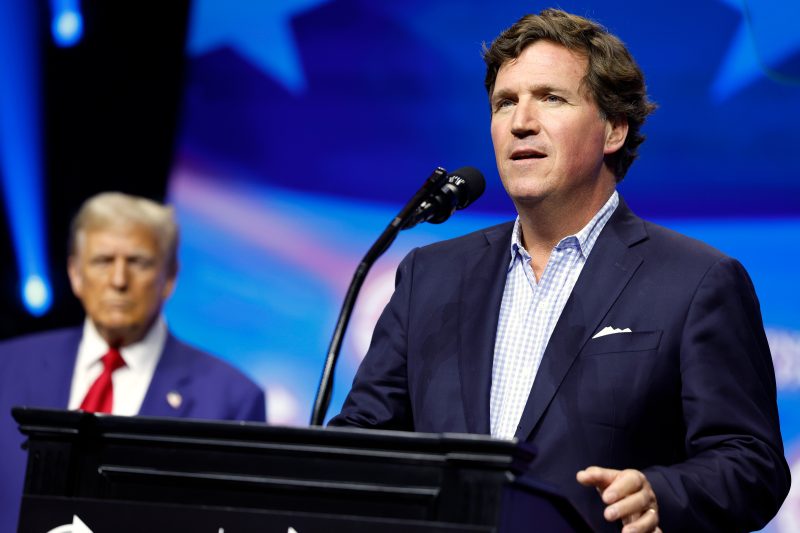Harris urges Black Americans not to be fooled into sitting out the race

Looking to shore up her support with the critical demographic of Black men, Kamala Harris charged during a town hall Tuesday night that Donald Trump had no plans to help them and exhorted those voters not to be fooled by Trump or anyone who would “take you out of the game by not voting.”
“The solutions that we all want are not going to happen in totality because of one election,” Harris said during a conversation with radio host Charlamagne tha God that was broadcast live across 140 radio stations. She acknowledged the sentiment of some Black men that Democrats have not always delivered on their promises, but urged them to fight through their disillusionment and vote in November rather than letting Trump and his allies dissuade them from voting.
“We cannot allow circumstances to take us out [of] the game, because then basically what we’re saying is all those people who are obstructionist — who are standing in the way of change — they’re winning, because they’re convincing people that it can’t be done, so ‘take yourself out. Don’t participate,’” Harris said. “Look at that vicious circle … let’s not fall for it.”
Harris’s wide-ranging interview with Charlamagne, a co-host of “The Breakfast Club” program that is enormously popular with younger Black voters, came at a moment when she is trying to shore up softer-than-expected support within that demographic.
Trump has been actively courting Black male voters, and while Harris is still winning a wide majority of them, some polls have shown her level of support falling behind Joe Biden’s in 2020. The erosion has concerned Democratic lawmakers and strategists who worry that it could become a significant factor in such a close race.
Among Black registered voters, 72 percent of men support Harris, compared with 85 percent of women, according to a Pew Research Center poll released last week, which is lower than the support Biden drew four years ago. Still, the polls have varied — a new CBS News-YouGov poll showed that 87 percent of Black voters were backing Harris, the same number who supported Biden in the 2020 exit poll.
Over the course of the hour-long interview on Tuesday night, Harris said several times that she is “clear-eyed” about the problems facing Black men in the United States and the historical factors that make it harder for them to prosper. Harris said she is determined to do more to help them build wealth and expand their access to capital.
Asked about her position on reparations for the descendants of enslaved people, Harris gave her usual answer that “it has to be studied.” She said she was running to be president for all Americans, adding “that being said, I do have clear eyes about the disparities that exist and the context in which they exist, meaning history.”
Harris on Monday released an “opportunity agenda for Black men,” including such proposals as forgivable loans for small businesses and renewed attention to health problems that disproportionately affect this group. On Tuesday, Harris was quick to contrast those plans with what she said was Trump’s lack of a platform to help Black men.
“We have brought down Black unemployment … to one of the lowest levels in history, but I’m very clear the community is not going to stand up and applaud just because everybody has a job,” Harris said. “That should be a baseline. My agenda is about tapping into the ambitions and the aspirations, knowing that folks want to have an opportunity.”
Trump has put notable effort into making inroads with Black voters, especially men, who typically vote for Democrats in large numbers. Trump has argued that despite their promises, Democrats have done little to improve the well-being of Black communities and that his policies would help them by turbocharging the economy overall.
Harris told Charlamagne that one of her biggest challenges is dealing with the misinformation about her record as a prosecutor, which has made some Black men hesitant to support her, and other disinformation about her record.
“Part of the challenge that I face is that they are trying to scare people away because they know they otherwise have nothing to run on,” Harris said.
Attempting to take on Trump’s perceived appeal to some male voters as a strong figure, Harris painted the former president as an autocrat. She contended that it is a sign of weakness rather than strength that Trump has, for example, threatened to enlist the military to target his political opponents or suggested he would seek to jail election workers and other officials.
Those threats show “the man is really quite weak,” the vice president said. “It’s a sign of weakness that you want to please dictators and seek their flattery and favor.”
Throughout the course of the interview, Harris touted her plans to help Black men build wealth and expand their access to lending, while boosting training and education opportunities through apprenticeship and increased support for historically Black colleges and universities.
In addition to the policies that she said would help Black-owned businesses succeed, Harris noted Tuesday night that many Black men are serving as caregivers for their older relatives while also caring for their own children as part of the “sandwich generation.” She touted her proposal to ensure Medicare covers the cost of home health care for seniors — without getting into detail about how difficult it could be to push that change through a divided Congress.
This week, she touted those proposals in private meetings with Black men, including at a Black-owned record store in Erie, Pa. And in Detroit before the radio interview, Harris met with a group of Black men for a talk about entrepreneurship at a Black-owned art gallery. She was joined by actors Don Cheadle and Delroy Lindo, as well as actor Cornelius Smith Jr., a Detroit native.
Trump has insisted that Black men should support his campaign rather than Harris’s because he will bring them more economic opportunities.
Earlier this summer, the former president questioned Harris’s racial identity during an appearance at a convention of Black journalists in July — falsely suggesting that she “happened to turn Black” relatively recently because it was politically convenient.
Harris, who belongs to a historically Black sorority and has spoken and written at length about her mixed-race heritage, dismissed the comments as “the same old show — the divisiveness and the disrespect.”
This week both Harris and her campaign have emphasized the work she has done throughout her career on behalf of Black voters. They have noted for example, the multistate tour that she did in April as vice president where she met privately with Black entrepreneurs, business owners and faith leaders.
At that time, Democrats were worried that Biden, who was then the likely nominee, was losing support among Black men.




